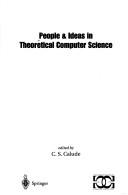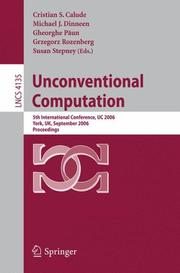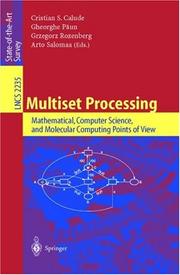| Listing 1 - 10 of 47 | << page >> |
Sort by
|
Book
ISBN: 3540851941 3540851933 Year: 2008 Publisher: Berlin, Heidelberg : Springer Berlin Heidelberg : Imprint: Springer,
Abstract | Keywords | Export | Availability | Bookmark
 Loading...
Loading...Choose an application
- Reference Manager
- EndNote
- RefWorks (Direct export to RefWorks)
This book constitutes the refereed proceedings of the 7th International Conference on Unconventional Computation, UC 2008, held in Vienna, Austria, in August 2008. The 16 revised full papers presented together with 4 invited papers were carefully reviewed and selected for inclusion in the book. The papers are devoted to all aspects of unconventional computation ranging from theoretical and experimental aspects to various applications. Typical topics are: natural computing including quantum, cellular, molecular, neural and evolutionary computing, chaos and dynamical system-based computing, and various proposals for computations that go beyond the Turing model.
Computer science --- Soft computing --- Computer science. --- Computer software. --- Bioinformatics. --- Computation by Abstract Devices. --- Algorithm Analysis and Problem Complexity. --- Computational Biology/Bioinformatics. --- Bio-informatics --- Biological informatics --- Biology --- Information science --- Computational biology --- Systems biology --- Software, Computer --- Computer systems --- Informatics --- Science --- Data processing --- Computers. --- Algorithms. --- Algorism --- Algebra --- Arithmetic --- Automatic computers --- Automatic data processors --- Computer hardware --- Computing machines (Computers) --- Electronic brains --- Electronic calculating-machines --- Electronic computers --- Hardware, Computer --- Cybernetics --- Machine theory --- Calculators --- Cyberspace --- Foundations --- Theory of Computation. --- Computational and Systems Biology.
Book
ISBN: 044470356X 9780444703569 9780080867755 0080867758 1281793132 9781281793133 9786611793135 6611793135 Year: 1988 Volume: 35 Publisher: Amsterdam : North-Holland,
Abstract | Keywords | Export | Availability | Bookmark
 Loading...
Loading...Choose an application
- Reference Manager
- EndNote
- RefWorks (Direct export to RefWorks)
This volume presents four machine-independent theories of computational complexity, which have been chosen for their intrinsic importance and practical relevance. The book includes a wealth of results - classical, recent, and others which have not been published before.In developing the mathematics underlying the size, dynamic and structural complexity measures, various connections with mathematical logic, constructive topology, probability and programming theories are established. The facts are presented in detail. Extensive examples are provided, to help clarify notions and construct
Discrete mathematics --- Informatique --- Computer science --- Computational complexity. --- Algebra. --- Computational Complexity --- Mathematics --- Mathematical analysis --- Complexity, Computational --- Electronic data processing --- Machine theory --- Computer science. --- Logique mathématique --- Récursivité, Théorie de la --- Logique mathematique --- Algorithmique --- Fonctions recursives --- Complexite

ISBN: 981402113X Year: 1999 Volume: *1 Publisher: New York Singapore Berlin Springer
Abstract | Keywords | Export | Availability | Bookmark
 Loading...
Loading...Choose an application
- Reference Manager
- EndNote
- RefWorks (Direct export to RefWorks)
Computer science --- Computer scientists --- Informatica --- Informatique

ISBN: 9783540385936 3540385932 3540385940 Year: 2006 Publisher: Berlin : Springer,
Abstract | Keywords | Export | Availability | Bookmark
 Loading...
Loading...Choose an application
- Reference Manager
- EndNote
- RefWorks (Direct export to RefWorks)
Soft computing --- Computer science --- Informatique douce --- Informatique --- Congresses. --- Congrès --- Computer Science --- Engineering & Applied Sciences --- Computer science. --- Computers. --- Algorithms. --- Bioinformatics. --- Computer Science. --- Theory of Computation. --- Computation by Abstract Devices. --- Algorithm Analysis and Problem Complexity. --- Bio-informatics --- Biological informatics --- Biology --- Information science --- Computational biology --- Systems biology --- Algorism --- Algebra --- Arithmetic --- Automatic computers --- Automatic data processors --- Computer hardware --- Computing machines (Computers) --- Electronic brains --- Electronic calculating-machines --- Electronic computers --- Hardware, Computer --- Computer systems --- Cybernetics --- Machine theory --- Calculators --- Cyberspace --- Informatics --- Science --- Data processing --- Foundations --- Information theory. --- Computer software. --- Software, Computer --- Communication theory --- Communication

ISSN: 03029743 ISBN: 3540430636 9783540430636 354045523X Year: 2001 Volume: 2235 Publisher: Berlin: Springer,
Abstract | Keywords | Export | Availability | Bookmark
 Loading...
Loading...Choose an application
- Reference Manager
- EndNote
- RefWorks (Direct export to RefWorks)
Electronic data processing --- Computer science --- Molecular computers --- Computer Science --- Engineering & Applied Sciences --- Mathematics --- Computer science. --- Data structures (Computer science). --- Computers. --- Mathematical logic. --- Bioinformatics. --- Computer Science. --- Data Structures. --- Data Structures, Cryptology and Information Theory. --- Mathematical Logic and Foundations. --- Computation by Abstract Devices. --- Mathematical Logic and Formal Languages. --- Automatic computers --- Automatic data processors --- Computer hardware --- Computing machines (Computers) --- Electronic brains --- Electronic calculating-machines --- Electronic computers --- Hardware, Computer --- Computer systems --- Cybernetics --- Machine theory --- Calculators --- Cyberspace --- Information structures (Computer science) --- Structures, Data (Computer science) --- Structures, Information (Computer science) --- File organization (Computer science) --- Abstract data types (Computer science) --- Informatics --- Science --- Bio-informatics --- Biological informatics --- Biology --- Information science --- Computational biology --- Systems biology --- Algebra of logic --- Logic, Universal --- Mathematical logic --- Symbolic and mathematical logic --- Symbolic logic --- Algebra, Abstract --- Metamathematics --- Set theory --- Syllogism --- Data processing --- Data structures (Computer scienc. --- Logic, Symbolic and mathematical. --- Data Structures and Information Theory. --- Electronic data processing - Congresses --- Computer science - Mathematics - Congresses --- Molecular computers - Congresses --- Data structures (Computer science)
Book
ISBN: 3642037445 3642037453 Year: 2009 Publisher: Berlin ; New York : Springer,
Abstract | Keywords | Export | Availability | Bookmark
 Loading...
Loading...Choose an application
- Reference Manager
- EndNote
- RefWorks (Direct export to RefWorks)
This book constitutes the refereed proceedings of the 8th International Conference on Unconventional Computation, UC 2009, held in Ponta Delgada, Portugal, in September 2009. The 18 revised full papers presented together with 8 invited talks, 3 tutorials and 5 posters were carefully reviewed and selected from 40 submissions. The papers are devoted to all aspects of unconventional computation ranging from theoretical and experimental aspects to various applications. Typical topics are: natural computing including quantum; cellular, molecular, neural and evolutionary computing; chaos and dynamical system-based computing; and various proposals for computational mechanisms that go beyond the Turing model.
Soft computing --- Computer science --- Computer Science --- Engineering & Applied Sciences --- Computer science. --- Computers. --- Algorithms. --- Bioinformatics. --- Life sciences. --- Computer Science. --- Computation by Abstract Devices. --- Life Sciences, general. --- Theory of Computation. --- Algorithm Analysis and Problem Complexity. --- Computational Biology/Bioinformatics. --- Models and Principles. --- Biosciences --- Sciences, Life --- Science --- Bio-informatics --- Biological informatics --- Biology --- Information science --- Computational biology --- Systems biology --- Algorism --- Algebra --- Arithmetic --- Automatic computers --- Automatic data processors --- Computer hardware --- Computing machines (Computers) --- Electronic brains --- Electronic calculating-machines --- Electronic computers --- Hardware, Computer --- Computer systems --- Cybernetics --- Machine theory --- Calculators --- Cyberspace --- Informatics --- Data processing --- Foundations --- Information theory. --- Computer software. --- Software, Computer --- Communication theory --- Communication --- Life Sciences. --- Computational and Systems Biology. --- Models of Computation.
Book
ISBN: 3642213405 3642213413 Year: 2011 Publisher: Heidelberg : Springer,
Abstract | Keywords | Export | Availability | Bookmark
 Loading...
Loading...Choose an application
- Reference Manager
- EndNote
- RefWorks (Direct export to RefWorks)
This book constitutes the refereed proceedings of the 10th International Conference on Unconventional Computation, UC 2011, held in Turku, Finland, in June 2011. The 17 revised full papers presented together with 6 extended abstracts of invited talks, and 3 extended abstracts of tutorials were carefully reviewed and selected from 33 initial submissions. The papers are devoted to all aspects of unconventional computation theory as well as experiments and applications. Typical topics are: natural computing including quantum, cellular, molecular, membrane, neural, and evolutionary computing, as well as chaos and dynamical system-based computing, and various proposals for computational mechanisms that go beyond the Turing model.
Engineering & Applied Sciences --- Computer Science --- Soft computing --- Computer science --- Computer science. --- Computers. --- Algorithms. --- Computer logic. --- Mathematical logic. --- Artificial intelligence. --- Bioinformatics. --- Computer Science. --- Computation by Abstract Devices. --- Algorithm Analysis and Problem Complexity. --- Mathematical Logic and Formal Languages. --- Artificial Intelligence (incl. Robotics). --- Logics and Meanings of Programs. --- Computational Biology/Bioinformatics. --- Bio-informatics --- Biological informatics --- Biology --- Information science --- Computational biology --- Systems biology --- AI (Artificial intelligence) --- Artificial thinking --- Electronic brains --- Intellectronics --- Intelligence, Artificial --- Intelligent machines --- Machine intelligence --- Thinking, Artificial --- Bionics --- Cognitive science --- Digital computer simulation --- Electronic data processing --- Logic machines --- Machine theory --- Self-organizing systems --- Simulation methods --- Fifth generation computers --- Neural computers --- Algebra of logic --- Logic, Universal --- Mathematical logic --- Symbolic and mathematical logic --- Symbolic logic --- Mathematics --- Algebra, Abstract --- Metamathematics --- Set theory --- Syllogism --- Computer science logic --- Logic, Symbolic and mathematical --- Algorism --- Algebra --- Arithmetic --- Automatic computers --- Automatic data processors --- Computer hardware --- Computing machines (Computers) --- Electronic calculating-machines --- Electronic computers --- Hardware, Computer --- Computer systems --- Cybernetics --- Calculators --- Cyberspace --- Informatics --- Science --- Data processing --- Foundations --- Computer software. --- Logic design. --- Artificial Intelligence. --- Design, Logic --- Design of logic systems --- Digital electronics --- Electronic circuit design --- Logic circuits --- Switching theory --- Software, Computer --- Machine theory. --- Theory of Computation. --- Formal Languages and Automata Theory. --- Computer Science Logic and Foundations of Programming. --- Computational and Systems Biology. --- Abstract automata --- Abstract machines --- Automata --- Mathematical machine theory --- Algorithms --- Recursive functions --- Robotics
Book
ISBN: 303653475X 3036534768 Year: 2022 Publisher: MDPI - Multidisciplinary Digital Publishing Institute
Abstract | Keywords | Export | Availability | Bookmark
 Loading...
Loading...Choose an application
- Reference Manager
- EndNote
- RefWorks (Direct export to RefWorks)
Book
Abstract | Keywords | Export | Availability | Bookmark
 Loading...
Loading...Choose an application
- Reference Manager
- EndNote
- RefWorks (Direct export to RefWorks)
The Fourth International Conference on Unconventional Computation, UC 2005, organized under the auspices of EATCS by the Centre for Discrete Mathematics and Theoretical Computer Science and the Department of C- puter Science and Arti?cial Intelligence of the University of Seville, was held in Seville, October 3–7, 2005. Seville, one of the most beautiful cities in Spain, is at its best in October. An explosion of colour and contrast: ?amenco, bull?ghting, and a lively at- sphere in the streets due to the open and friendly nature of its people. The river Guadalquivir, the Cathedral and the Golden Tower are all places full of magic where the visitor can feel the spirit of a city which is eternally romantic. The series of International Conferences Unconventional Computation (UC),https://www.cs.auckland.ac.nz/CDMTCS/conferences/uc/isdevoted to all aspects of unconventional computation, theory as well as experiments and applications. Typical, but not exclusive, topics are: natural computing including quantum, cellular,molecular, neural and evolutionarycomputing; chaosand - namical systems based computing; and various proposals for computations that go beyond the Turing model. The ?rst venue of the Unconventional Computation Conference (formerly called Unconventional Models of Computation) was Auckland, New Zealand in 1998; subsequent sites of the conference were Brussels, Belgium in 2000 and Kobe, Japan in 2002. The titles of the proceedings volumes from past UC Conferences are as follows: 1. C.S. Calude, J. Casti, M.J. Dinneen (eds.). Unconventional Models of C- putation, Springer-Verlag, Singapore, 1998, viii + 426 pp. ISBN: 981-3083- 69-7.
Computer science. --- Algorithms. --- Bioinformatics. --- Theory of Computation. --- Soft computing --- Computer science
Book
Abstract | Keywords | Export | Availability | Bookmark
 Loading...
Loading...Choose an application
- Reference Manager
- EndNote
- RefWorks (Direct export to RefWorks)
The Fourth International Conference on Unconventional Computation, UC 2005, organized under the auspices of EATCS by the Centre for Discrete Mathematics and Theoretical Computer Science and the Department of C- puter Science and Arti?cial Intelligence of the University of Seville, was held in Seville, October 3–7, 2005. Seville, one of the most beautiful cities in Spain, is at its best in October. An explosion of colour and contrast: ?amenco, bull?ghting, and a lively at- sphere in the streets due to the open and friendly nature of its people. The river Guadalquivir, the Cathedral and the Golden Tower are all places full of magic where the visitor can feel the spirit of a city which is eternally romantic. The series of International Conferences Unconventional Computation (UC),https://www.cs.auckland.ac.nz/CDMTCS/conferences/uc/isdevoted to all aspects of unconventional computation, theory as well as experiments and applications. Typical, but not exclusive, topics are: natural computing including quantum, cellular,molecular, neural and evolutionarycomputing; chaosand - namical systems based computing; and various proposals for computations that go beyond the Turing model. The ?rst venue of the Unconventional Computation Conference (formerly called Unconventional Models of Computation) was Auckland, New Zealand in 1998; subsequent sites of the conference were Brussels, Belgium in 2000 and Kobe, Japan in 2002. The titles of the proceedings volumes from past UC Conferences are as follows: 1. C.S. Calude, J. Casti, M.J. Dinneen (eds.). Unconventional Models of C- putation, Springer-Verlag, Singapore, 1998, viii + 426 pp. ISBN: 981-3083- 69-7.
Computer science. --- Algorithms. --- Bioinformatics. --- Theory of Computation. --- Soft computing --- Computer science
| Listing 1 - 10 of 47 | << page >> |
Sort by
|

 Search
Search Feedback
Feedback About UniCat
About UniCat  Help
Help News
News